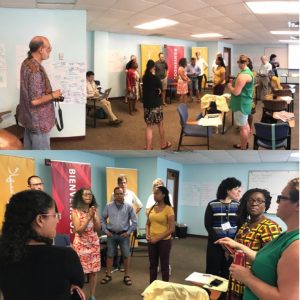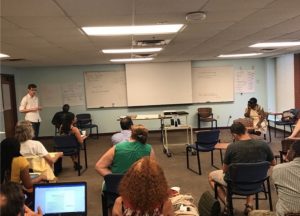 Today was the last day for lectures and we finished with a bang. The morning lectures included topics of migration and the causes of migration as well as how it relates to remittances. We broke into pairs and discussed our personal migrations along with the reasoning of the moves. Universally family, education, and opportunity guided our reasons for migration. We ended the morning session learning about Alabama ASPIRE. This organization focuses their time, energy and resources to influence legislators votes on policies that would improve the quality of life for rural Alabama families. These policies range from increasing income tax requirements to eliminating taxes on food.
Today was the last day for lectures and we finished with a bang. The morning lectures included topics of migration and the causes of migration as well as how it relates to remittances. We broke into pairs and discussed our personal migrations along with the reasoning of the moves. Universally family, education, and opportunity guided our reasons for migration. We ended the morning session learning about Alabama ASPIRE. This organization focuses their time, energy and resources to influence legislators votes on policies that would improve the quality of life for rural Alabama families. These policies range from increasing income tax requirements to eliminating taxes on food.
After Lunch, our day continued with a session on feeding the world, a social justices approach. We were introduced to social Justice perspective in the food supply chain and we discussed the Oligopolistic links and how it creates unbalanced negotiation power among actors. We learned that to counterbalance the concentration of power, there is need for the creation of farm producers’ organization and niche markets. This will the farm producers to negotiate directly with consumer and thus increase negotiation power. In addition, we discussed how heterosis effect can be used to improve production. To help reduces challenges, food supply chain needs to be managed by government and at the same time the food supply should be enshrined into a territory so as to foster security at the local level.
Next, we discussed Biotechnology to feed the world!!!! We considered the shift of Paradigm from antiquity to agriculture revolution. The next big thing now is Genome editing as well as Big data and precision Agriculture which utilize technology advancement which constitute a quicker way to make changes.
 The last lecture of the day focused on organic production and small-scale farming. We learned that there is an obvious gap between conventional and organic farming. Generally, more research opportunities and incentives are available to conventional farmers. Another important point is the higher labor needed for organic farming versus conventional farming which explains why organic food products are more expensive. However, we were reminded that it is a choice to either choose between organic or non-organic food products, so, if you want to change what you put inside change what you are eat.
The last lecture of the day focused on organic production and small-scale farming. We learned that there is an obvious gap between conventional and organic farming. Generally, more research opportunities and incentives are available to conventional farmers. Another important point is the higher labor needed for organic farming versus conventional farming which explains why organic food products are more expensive. However, we were reminded that it is a choice to either choose between organic or non-organic food products, so, if you want to change what you put inside change what you are eat.
After, we broke out into groups to discuss our final Presentation. The break-out session lasted for about 3 hours. It was great to see student gather together to prepare for their final presentations. Safe to say that we are ready to address to disparity issues.
